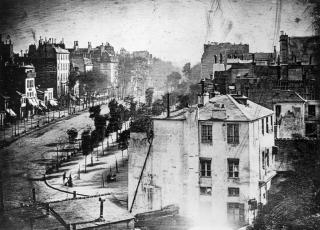It looks like a decent enough morning for strolling down the Boulevard du Temple instead of taking a carriage, decides M. Jean Jacques Truffaud, homme d'affaires and patron of the arts. That at least is something to be pleased about. He has just had yet another bad tempered exchange with his wife, this time about his latest purchase from his shoemaker. He had ordered a particularly stylish pair of black boots, which had been delivered yesterday and which he had already worn all day, and had shown them off to Marie Celeste with some pride. However she seemed to be in a temper which exceeded even her normal peevish demeanour, and had simply dismissed them with a "Pah!" of contempt. When he rebuked her, demanding an apology, she had instead embarked on a long litany of his latest extravagances and a whine about rising prices in the shops. When she then moved on to describing, not for the first time, the difficulties of keeping a maid at the derisory wage he was prepared to allow, he had told her in no uncertain terms to hold her tongue.
Now he strides down the street with his spirits improving, twirling his moustaches. The little cireur des chaussures bids him good morning, and asks him if he would like his new boots highly polished. Jean Louis normally has this chore performed by the maid, but for some reason she has not appeared this morning, pleading some pathetic nonsense about a sick child, so he hesitates and then acquiesces. "But be sure to do them properly," he snaps. "And I don't want any of your imbecile chatter while you do it." The shoeblack flashes a meaningless toothy grin and applies himself vigorously to his task. Around them the carriages are plying briskly down the boulevard, and passers by are enjoying the springtime sun on their faces as they go about their business. At this moment, unknown to either of them, and by a process of which they are completely ignorant, this little scene is being recorded for posterity. The unseen photographer is Louis Daguerre, who is concealed in a window overlooking the boulevard. Because the slow exposure means that moving traffic does not register, and that for a brief instant the customer and the shoeblack are the only motionless components of the busy street scene, only these two men will appear on the developed picture.
The year is 1838. Twenty years later this boulevard and all its buildings will be swept away by Baron Haussmann's visionary and drastic reform of Paris, which will dramatically replace the disease ridden medieval slums with a revolutionary cityscape. And a hundred and fifty years after that, a thousand cars a minute will be thundering every day over this spot towards the Arc de Triomphe, in five lanes of horn-blowing, tyre-screeching, carbon monoxide-belching fug. But for an instant frozen forever in time, Jean Jacques stands gazing down the boulevard on an 1838 spring morning, showing off his new pair of leather boots, his knee crooked for the shoeblack's attentions and a slight smile on his face. Now he throws a few centimes at the shoeblack, and proceeds at a stately pace down the boulevard, entirely unaware of being the subject of the very first moment in a million years of mankind's history that the image of human beings will be recorded on camera.
Richard Vaughan-Davies
I retired to the Cotswolds ten years ago after selling the retail business in North Wales which I had built up over forty long years. Fortunately for my sanity most of my time was spent creating advertising copy and promotions, which dramatically increased the business and taught me the power of words. Being a member of the Chippy Writers’ Group encouraged me to attempt a lifelong ambition to write a novel. Recently published, In the Shadow of Hitler is a romance set in the ruins of bombed-out Hamburg in 1946.
... more
